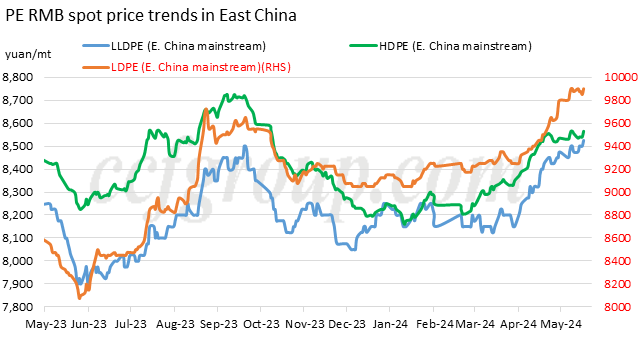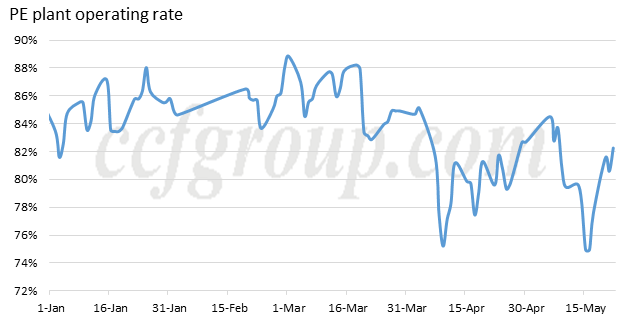PE market in consolidation amid anemic supply and demand
Since April, China domestic PE market has been fluctuating upwards, with overall market sentiment remaining relatively positive. There has been some improvement in overall transactions. However, after entering May, the upward trend in the market has slowed down, indicating a potential return to a period of volatility.

In the early period, the main driving force of the market was the relatively tight supply of LDPE, which had a significant impact on the market. LDPE saw price increases that were notably higher compared to other varieties, with price spread also widening significantly. However, at present, the support for LDPE is insufficient. Additionally, the biggest issue currently lies in the overall imbalance between supply and demand, with both sides leaning towards scarcity. The market's initial expectation is a return to a period of volatility.
Firstly, the supply is relatively tight. Currently, domestic PE plants are still undergoing intensively spring maintenance. In mid-May, the operating rate of domestic PE plants has dropped below 75%, reaching the lowest level in 2024. There are a significant number of planned maintenance shutdowns, while there are also several unplanned shutdowns, with the most notable being FREP. Additionally, Sinopec Qilu PC which shut due to troubles at the end of 2023, is also closed currently without a restart plan. Furthermore, there are some temporarily shut down plants. Overall, the current overall operating rate is low. However, starting in mid-May, some plants are scheduled to restart gradually, leading to a slight increase in overall production expectations.

Second, the import situation. In the second quarter, overseas plant maintenance is also relatively concentrated. For example, some plants in Saudi Arabia were shut down. In addition, due to the tense situation in the Middle East and various issues with Red Sea shipping, some vessels' transportation has been restricted, leading to overall delays in shipping schedules. Arrivals are expected to be limited. This situation has gradually become apparent in the market since April and has, to some extent, influenced market developments. Looking ahead, although some plants are gradually restarting after maintenance, the impact of the Middle East situation on shipping schedules may still persist.
Lastly, the downstream demand. After entering May, the spring ploughing in the northern regions has mostly concluded, leading to a significant decrease in demand for agricultural films as returns to the off-season. Factories are operating at low rates, with some small plants even shutdown, resulting in a substantial contraction in raw material demand. Demand for greenhouse films is also in the off-season. Other downstream industries, such as packaging films, are less affected by seasonal fluctuations, but May typically represents a quieter period. Overall, the current market is experiencing a seasonal lull, and it is preliminarily expected that the performance from June to August will be relatively consistent, with a slowdown in purchasing pace primarily supported by minimal essential needs.
In conclusion, although LDPE supply remains relatively scarce, the influence of the market driven by LDPE in recent years has been gradually diminishing. This has dampened market expectations, leading to cautious trading activities this year. Furthermore, with domestic plant maintenance concentrated and import volumes lower than before, market supply has been affected. However, market demand is poor, and it is anticipated that the market will continue to experience wide fluctuations. Looking ahead, as plants gradually restart and import supplies arrive, while demand remains subdued in the off-season, there is significant room for the market price to decline.
- Top keywords
- Cotton Price
- Cotton Futures Price
- Cotton Futures
- CZCE
- PTA Futures Price
- Chemical Fiber
- Polyester Prices
- Wool price
- PTA Futures
- Shengze Silk
- China
- Yarn Price
- price
- China Textile City
- Fibre Price
- Benzene Price
- Cotton
- Index
- Cotton Index
- PTA
- fabric price
- NYMEX
- Top 10
- textile industry
- Spot Cotton
- Cotton Yarn
- Polyester Price
- Futures
- PTA Price
- cotton yarn price

